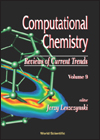 COMPUTATIONAL CHEMISTRY: REVIEWS OF CURRENT TRENDS - volume 9
COMPUTATIONAL CHEMISTRY: REVIEWS OF CURRENT TRENDS - volume 9
edited by Jerzy Leszczynski (Jackson State University, USA)
Vast progress in the area of computational chemistry has been achieved in the last decade. Theoretical methods such as quantum mechanics, molecular dynamics and statistical mechanics have been successfully used to characterize chemical systems and to design new materials, drugs and chemicals. The reviews presented in this volume discuss the current advances in computational methodologies and their applications. The areas covered include materials science, nanotechnology, inorganic and biological systems. The major thrust of the book is to bring timely overviews of new findings and methods applied in the rapidly changing field of computational chemistry.
Contents:
- Molecular Electronics with Gaussian98/03 (J J Palacios et al.)
- Molecular Dynamics Simulations of Single Molecule Atomic Force Microscope Experiments (W Nowak & P E Marszalek)
- Molecular Dynamics Simulations of a Molecular Electronics Device: The NanoCell (J Seminario et al.)
- Computation of Excited State Potential Energy Surfaces via Linear Response Theories Based on State Specific Multi-Reference Coupled Electron-Pair Approximation Like Methods (S Chattopadhyay et al.)
- Modelling of Anisotropic Exchange Coupling in Rare-Earth-Transition-Metal Pairs: Applications to Yb3+-Mn2+ and Yb3+-Cr3+ Halide Clusters and Implications to the Light Up-Conversion (M Atanasov et al.)
- Is a Dihydrogen Bond a Unique Phenomenon? (S J Grabowski & J Leszczynski)
View Full Text (14,048 KB)
Readership: Graduate students and researchers in computational
chemistry.
"This book is also an excellent source of information not only for advanced specialists, but also for graduate as well as undergraduate students."
Professor W A Sokalski
Wroclaw University of Technology |
"The contents of the book is quite well-balanced; there is a good mix of both somewhat general topics and topics that are of wide current interest. It will be useful and interesting for chemists, physicists and materials scientists."
Professor Kang Hway Chuan
National University of Singapore |


